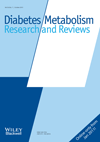Effect of acarbose to delay progression of carotid intima–media thickness in early diabetes
Abstract
Background
The anti-diabetic agent acarbose reduces postprandial glucose excursions. We have evaluated the effect of randomized treatment with acarbose on the progression of carotid intima–media thickness (IMT) in early diabetes.
Methods
The Early Diabetes Intervention Program was a randomized trial of acarbose versus placebo in 219 participants with early diabetes characterized by glucose values over 11.1 mmol/L 2 h after a 75 g oral glucose load and a mean HbA1c of 6.3%. IMT was measured at baseline and yearly. Follow-up was discontinued if participants progressed to the study glucose endpoints; IMT readings were available for a median of 2 years, with 72 subjects followed for 5 years.
Results
Progressive increases in IMT were seen in both treatment groups, but progression was reduced in participants randomized to acarbose (p = 0.047). In age, sex and smoking-adjusted analyses, IMT progression was associated with greater fasting and oral glucose tolerance test-excursion glucose, fasting insulin, cholesterol and glycated low-density lipoprotein concentrations. IMT progression was reduced with study-related changes in weight, insulin and non-esterified fatty acids; these features were more strongly associated with reduced IMT progression than acarbose treatment. Despite strong associations of baseline glycemia with IMT progression, study-related changes in glucose were not important determinants of IMT progression.
Conclusions
Acarbose can delay progression of carotid intima–media thickness in early diabetes defined by an oral glucose tolerance test. Glucose, weight, insulin and lipids contributed to risk of progression but reductions in glycemia were not major determinants of reduced rate of IMT progression. Vascular benefits of acarbose may be independent of its glycemic effects. Copyright © 2013 John Wiley & Sons, Ltd.




